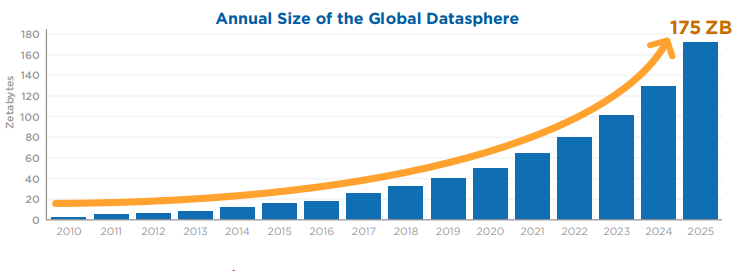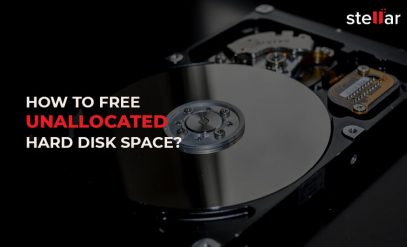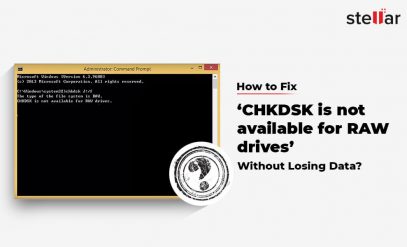[Solution] : How To Recover Data From Crashed Hard Drive?
Hard drives are one of the widely used storage devices because of their greater storage capacity, low cost and a longer lifetime with due care. In the recent past, technology has grown at an exponential rate. Data creation (for example, downloading a document or video, etc.) because of easy availability of inexpensive and high-speed internet and the need to store personal and official data have increased the usage of storage devices like hard drives.
International Data Corporation (IDC) predicts that the data created throughout the globe will grow from 33 Zettabytes (ZB) in 2018 to 175 ZB by 2025. This massive increase in data creation would increase the demand for storage devices at a much higher rate. IDC forecasts that over 22 ZB of storage capacity must ship across all media types from 2018 to 2025, with nearly 59% of that capacity supplied from the HDD (Hard Disk Drive) industry.
इस पोस्ट को हिंदी में पढ़ने के लिए यहां क्लिक करें।

Image Source: https://bit.ly/2CbhZN1
The statistics given above shows that we are hugely dependent upon hard drives to store a large amount of data. Due to this dependency, a hard drive crash could be a nightmare as it might result in huge data loss.
Have you lost your important data because your hard drive has crashed? Do you want to recover data from crashed hard drive? In this blog, we will discuss the symptoms of a crashed hard drive, cautions to be taken before the recovery of data from a crashed hard drive.
What is meant by a “Crashed Hard Drive”?
“Crashed Hard Drive” is a term used to correspond to a hard drive that stops functioning. A hard disk can crash because of any physical damage or logical failure.
How do you know that your hard drive crashed?
Look for the following symptoms experienced before a hard drive crash:
Before crashing, hard drives give you indications of an impending crash. These symptoms could either be associated with physical damage or a logical failure.
Symptoms of Hard Drive Physical Damage
Grinding, clicking or grinding noises from hard drive are the indicators of a crashing hard drive. Sometimes, the area around the hard drive gets overheated, which is again a potential indicator.
Physical damage to the hard drive may lead to the loss of system or personal files. Hence, if you find that your data is missing or you suspect that some system files are missing as the system has become sluggish, you may consider this as a sign of physical damage.
If you are encountered with a blue screen of death error after turning your machine “ON” and it never proceeds further, your hard drive may have been physically damaged.
Symptoms of Hard Drive Logical failure
If you observe the following symptoms, your hard drive is probably crashing and may suffer a complete crash if not taken care of:
- The PC won’t boot into the OS
- You are unable to open a file
- Your PC has become sluggish
- Some data is missing
- Your files are getting corrupt
- Your PC returns an error “File not found” while trying to boot
- You see a blue screen (Also called the Blue Screen Of Death)
If you are alert enough to observe the signs of a hard drive crash and take immediate actions, half of the job is done. Your actions would prevent further data loss and also would make data recovery easier & efficient.
Steps to recover data from crashed hard drive
The data recovery approach for a crashed hard drive would depend on the nature of crash — logical or physical. Which can be easily ascertained with the help of failure symptoms enumerated in the previous sections.
Once you know the exact nature of hard drive crash, follow these notes and steps to get back your date safely while preserving the storage media.
Notes:
- Avoid using hit-and-trial methods for data recovery, as this may end up in permanent data loss.
- Never try to dismantle a crashed hard drive on your own.
Tips to Avoid Data loss from Hard Drives –
1: Backup data if you can still access the hard drive as soon as you observe the symptoms of the crash.
2: Keep your storage device away from heat or high humidity; it can be a cause of physical damage.
3: Stop using the hard disk if it’s a case of a physical crash. Seek immediate help of professional Data Recovery Services for secure data recovery.
4: Use a trusted antivirus program to keep your machine free from Malware.
Conclusion
Taking preventive measures and backing-up data on a regular basis are the keys to avoid data loss in case of a crashed hard drive. Choosing an option to recover data from crashed hard drive is your decision. Trying to do it on your own worsens the situation. So, choose and consult a renowned and trustworthy brand with proven track record and experience in recovering data from a crashed hard drive.
Additional Reading: How To Retrieve Data From Internal Hard Disk







